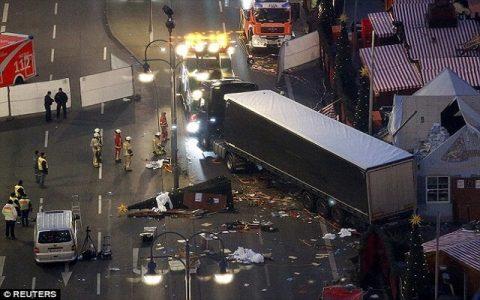
ISIS truck killer Anis Amri may have been high on cocaine and ecstasy when he ploughed through a Berlin Christmas market
Christmas market lorry killer Anis Amri may have been high on cocaine and ecstasy when he ploughed into a crowd in Berlin. Amri, 24, was a drug dealer in the German capital to support himself as he plotted terror for Islamic State. Now it is claimed he was also an addict.
The Welt am Sonntag newspaper, citing security sources, said intelligence services will report to the parliamentary control committee of the Bundestag on Monday that he may well have been under the influence when he steered a hijacked lorry into the market on December 19, killing 12 and wounding dozens more.
Only the automatic locking system on the vehicle’s brakes brought it to a stop and prevented further carnage.
Italian police, who shot Amri dead in Milan on December 23, found no drugs on him or in his backpack.
They discovered only 1,000 euros in cash, a train ticket from France, a Dutch mobile phone SIM card and shaving cream. According to the German news report, drug dealers in Berlin have told intelligence officials that Amri was a ‘regular’ consumer of drugs.
And in his hometown in Tunisia he was arrested several times for drug offences in his youth.
Officials are probing whether his love of narcotics may have contributed to him falling off the watchlist of the security services who did not believe a drug addict could also be a terrorist.
A senior ally of German Chancellor Angela Merkel has said he is open to launching a parliamentary inquiry into whether authorities made mistakes in handling the Tunisian man who drove a truck into a Christmas market in Berlin.
Attacker Anis Amri had been rejected for asylum in Germany but authorities had been unable to deport him.
Amri, who had used at least 14 different identities since coming to Germany, also was on their radar as a potential security risk. Volker Kauder, the caucus leader of Merkel’s conservative Union bloc, noted Saturday there are questions whether there were coordination problems between federal and state authorities, news agency dpa reported.
He added: ‘If one of is of the opinion that more needs to be done here, I am open to a committee of inquiry.’
Germany was rocked by terror last year, heaping pressure on chancellor Angela Merkel’s open-door immigration policy.
A bloody week of violence that rocked Germany began on July 18 when Pakistani teenager Riaz Khan Ahmadzai, 17, posing as an Afghan refugee, hacked at passengers on a train in Wurzburg with an axe, wounding five.
He was shot dead by police.
Four days later mentally unstable German-Iranian teenager Ali Sonboly shot nine people dead during a rampage through a shopping centre in Munich before taking his own life.
Sonboly claimed he was taking revenge for being bullied at school with no political motive to the murderous rampage.
Earlier that month, a suspected ISIS airport bomb plotter hanged himself in a German prison after being arrested following a manhunt.
Syrian national Jaber al-Bakr, 22, was found dead in his cell in Leipzig, eastern Germany on Wednesday evening – having reportedly used his own t-shirt – and was taken away overnight
He was detained on Sunday after three days on the run following a tip-off that he may have been looking to team up with associates in Leipzig.
Al-Bakr had built ‘a virtual bomb-making lab’ in a flat in Chemnitz and was thought to have planned an attack against either one of Berlin’s two airports or a transport hub in his home state of Saxony, security sources said.
Chemnitz was on lockdown for hours when police raided his flat but failed to seize him before he was captured by fellow Syrian nationals who tied him up and handed him over to the authorities.
And on Monday, December 19, Tunisian ISIS fanatic Anis Amri hijacked a 35-tonne truck and ploughed it into a Christmas market in Berlin, killing 12 people.
Source: /Daily Mail





